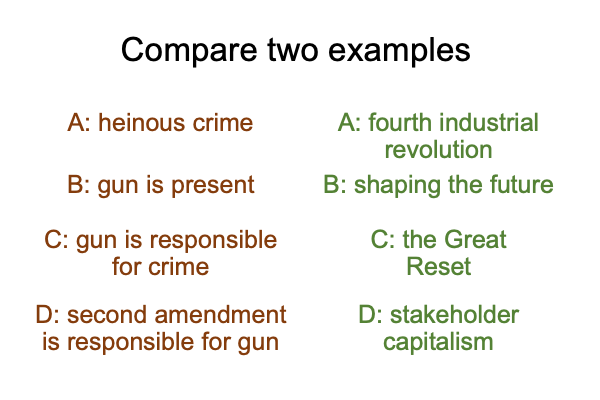0057 The Greimas square serves as relational structure for an act of persuasion. The act of persuasion generates an apparent mind-independent being (D) that speaks against the originating mind-independent being (A). In a way, I can say that a mind-dependent being regarded as mind-independent (D) usurps attention away from the original mind-independent being (A).
Perhaps, D ends up replacing A as mind-independent being.
Oh my.
0058 So far, I have considered several examples. Two are of note. One is the scripted corporate media response to a heinous crime where a gun is involved. Two follows the arc of Klaus Schwab’s titles (K1-K5).

0059 In the first example, the second amendment (a mind-dependent being regarded as a mind-independent being) (D) accounts for the gun that is responsible for the crime (C) because the forbidden thing (B) is present at the scene of a horrible crime (A).
In the second example, stakeholder capitalism (a mind-dependent being that becomes mind-independent through a global sovereign) (D) comes out of the Great Reset (C) that is an inevitable consequence of shaping the future (B) in the face of the fourth industrial revolution (and especially the crisis of covid-19) (A).
0060 These two examples demonstrate the concept that certain acts of persuasion manifest as the updated scholastic Greimas squares.
Is the Greimas square an exercise in logic?
If not, then, what is it?
I suspect that these acts of persuasion are somehow intrinsic to the nature of speech-alone talk.
Why?
Words are placeholders in systems of differences and the Greimas square is a formalized system of differences.
Yeah, whatever.
0061 On top of that, the updated scholastic Greimas square revives a long-standing (and currently defunct) debate among medieval schoolmen about the distinction between ens reale and ens rationis. Greimas’s formalism adds two more terms, which I label “illusion” and “delusion”.

0062 What does this have to do with Alex Jones?
Alex Jones disrupts. He disrupts globalist acts of persuasion. He calls out illusions and delusions. He is so good at it that the globalists must… well… hold him responsible for psychological damages of a real crime that he did not commit. He must be silenced!
Yes, he offends Klaus Schwab.
Of course, I don’t know whether any of this is true. I am just guessing. I am not a lawyer. I am not a confidant of anyone at the World Economic Forum.
All I do is look at ongoing situations, as well as texts, and try associate what I see into the empty slots of a purely relational structure.
0063 So, I look at Jones’s text for a disruption of the following relational structure.

0064 I find an interesting tidbit.
Right in chapter one, Jones says that Schwab’s literary and persuasion skills lie at the heart of K1. Persuasion is important. Schwab uses a three-pronged approach. Jones labels Schwab’s template as “problem, reaction and solution”.
Does this fit into the updated scholastic Greimas square?
Take a peek at my guess.

0065 Is Jones on the verge of ideating this commentary?
Or, is Jones staking out targets?
0066 In chapter two, Jones goes after the reaction (C). In the Great Reset, the modern world reacts (C) as the mind-independent being of the fourth industrial revolution (A) engenders a mind-dependent being, the plans of the World Economic Forum for shaping the future (B).
Jones asks (more or less), “What does that mean?”
Oh, in layman’s terms, the Great Reset (C) implements systems of control (B).
0067 Contributing to the layman’s disorientation, shaping the future (B) entails novel nomenclature, such as “public-private partnership”, “distributing benefits”, “managing externalities” and “human-centered future”.
Surely, these terms code for policy actions during the Great Reset (C).
So, how do we appreciate the nature these plans (B) as their implementation (C) unfolds as systems of control?
Is illusion (C) too strong of a term?
0068 According to the structure of the Greimas square, the Great Reset (C) speaks against the World Economic Forum’s plans to shape the future (B). C contradicts B because C implements B.
Does implementation (C) tell me when a plan (B) does not work?
Definitely, especially when C implements systems of control (mind-independent beings) that are popularized as plans for shaping our future (mind-dependent beings).
0069 Does C implements B compare to a reaction (C) that contradicts a problem (B)?
The problem (B) is a mind-dependent being. For Schwab, the problem of shaping the future (B) contrasts with the fourth industrial revolution (A) in the same way that a mind-dependent being (B) contrasts with a corresponding mind-independent being (A). The problem (B) entails the formulation of a plan (B). The plan is filled with jargon, such as “public-private partnership”, whose implementation creates mind-independent beings that are regarded as mind-dependent (C). These apparently mind-dependent beings (C), are, like all illusions, reactionary.
An illusion (C) is a reaction (C) to a problem (B).
